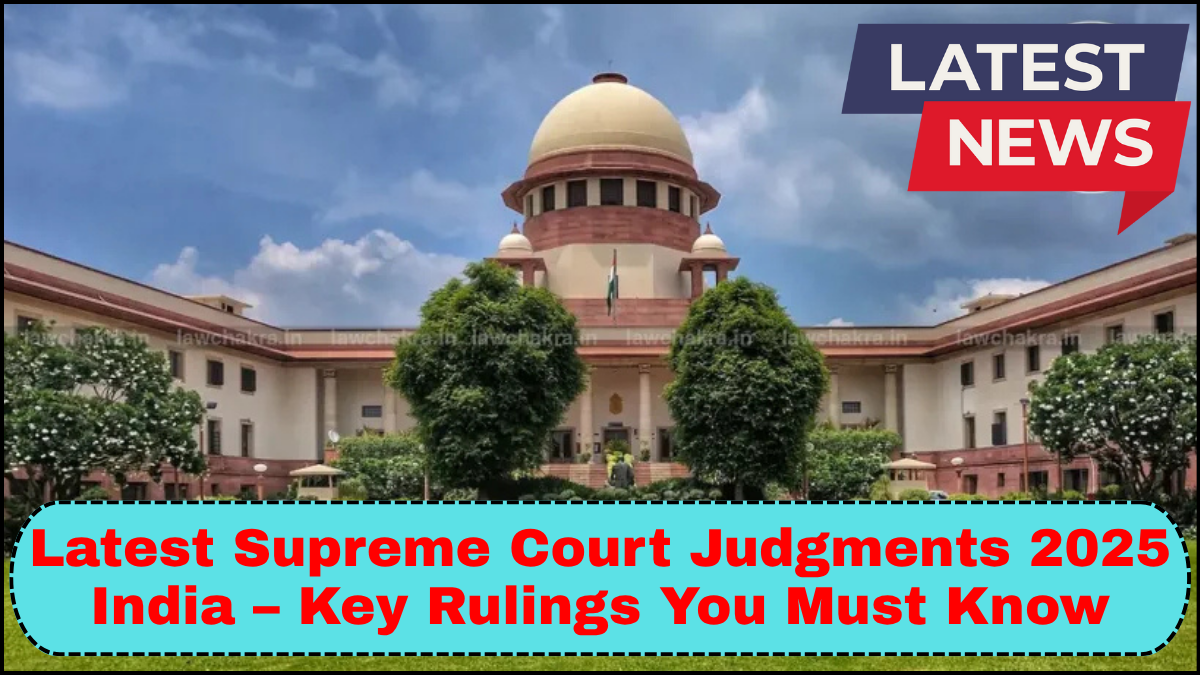The latest Supreme Court judgments 2025 India have delivered impactful shifts in legal interpretation, public policy, and constitutional clarity. From civil liberties to economic regulation, the apex court’s decisions this year have not only shaped the law but set the tone for future governance and judicial thought. Below are the key rulings and landmark decisions you should be aware of.

Electoral Bonds Scheme Declared Unconstitutional
In one of the most debated landmark decisions, the Supreme Court struck down the Electoral Bonds Scheme, ruling it unconstitutional. The court held that anonymous political donations via bonds violated the fundamental right to information under Article 19(1)(a).
Key Highlights:
- The judgment emphasized transparency in political funding.
- The court ordered disclosure of all electoral bond donations since the scheme’s inception.
- This ruling is expected to reform campaign financing norms in India.
This verdict has become a cornerstone in promoting clean politics and has significant implications for political accountability.
Affirmation of Same-Sex Marriage Rights Deferred
In a long-anticipated case, the Supreme Court acknowledged the rights of same-sex couples but refrained from granting legal recognition to same-sex marriages. The bench ruled that it was Parliament’s prerogative to enact such laws.
Implications:
- The court directed the government to ensure protection and non-discrimination against same-sex couples.
- It urged the creation of a high-level committee to explore legal rights such as insurance, inheritance, and medical consent.
Though not a full win for LGBTQIA+ rights, this legal update keeps the door open for future progressive legislation.
Extension of Reservation in Promotions Upheld
The court upheld the constitutional validity of reservation in promotions for SC/ST employees in public services, reiterating its commitment to affirmative action.
Key Aspects:
- The judgment clarified that reservation in promotion is not a fundamental right but a matter of policy.
- It directed states to collect quantifiable data before implementing such policies.
This ruling is a key ruling in addressing systemic inequalities within public employment structures.
Supreme Court Backs Delhi Government on Services Control
Another major verdict came in the ongoing power tussle between the Delhi Government and the Centre. The court ruled that the elected government of Delhi has legislative and administrative powers over services, excluding police, land, and public order.
Why It Matters:
- Reinforces the concept of federalism.
- Strengthens democratic accountability in Union Territories with elected assemblies.
This decision sets a precedent for the limits and responsibilities of state and central authority.
Online Free Speech Gets a Boost
In a pivotal landmark decision, the Supreme Court invalidated the practice of arresting individuals for social media posts deemed offensive under outdated laws. The court reaffirmed that freedom of expression cannot be curtailed by arbitrary arrests.
Legal Impact:
- It declared Section 66A of the IT Act as unconstitutional, reaffirming an earlier 2015 verdict.
- Police departments across states were instructed to cease arrests under this provision.
This judgment is a crucial legal update for journalists, digital activists, and content creators.
FAQ: Latest Supreme Court Judgments 2025 India
Q1: What is the most significant Supreme Court ruling in 2025 so far?
The judgment striking down the Electoral Bonds Scheme is widely considered the most consequential due to its impact on political transparency and campaign finance reform.
Q2: Has the Supreme Court legalized same-sex marriage in India?
No, the court deferred the matter to Parliament but acknowledged the need to protect the rights of same-sex couples.
Q3: What are the implications of the Delhi services verdict?
It strengthens the role of the elected government in Delhi, reinforcing federal principles and limiting central overreach.
Q4: How do these judgments affect the common citizen?
They shape citizens’ rights to information, equality, expression, and participation in governance, directly influencing everyday freedoms and protections.
Q5: Where can I find authentic sources for these legal updates?
Official Supreme Court websites, reputable legal news portals like Bar & Bench or LiveLaw, and government publications provide reliable information.
click here to learn more